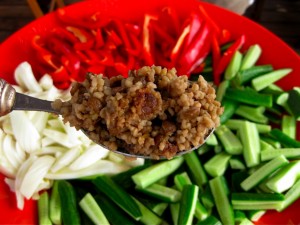An Insight into Freshmen Eating Habits
By Noamme Elisha
Managing classes, homework, sleep, and a social life is a concept most freshmen are capable of handling, dating way back to the pre-historic high school days. Adding laundry, dishes, vacuuming, money-management, food, and all the other stresses that come along with living alone can be overwhelming.
“I never did laundry. And I cleaned my room, like, once every five months at home,” said Rachel Dorsey, an SAIC freshman from New Rochelle, New York, who shares her living space with two other roommates.
Laundry is essential for the art-school fashionista. Dishes are a must for the coffee-addicted academic. But after laundry and dishes, it’ s easy to lose sight of food.
“After school, I used to come home and Mom would make us sticky rice and sugar —it’ s like a snack thing,” said Kirsten Miranda, whose mom is far away in Miranda’s hometown of Singapore. “ I don’ t know what to eat,” she continues. “ Let me browse the kitchen. Do we have a waffle maker?”
Food is rather important, especially when it comes to those who have just begun the transformation from angst-ridden teens to potentially accomplished artists. It’ s easy for us to get so caught up in all the other school work and chores that we don’ t care what fuels our body and mind. Lots of students are content with a quick trip to McDonald’ s, and it doesn’ t help that there are three within walking distance of the dorms.
Freshman Tyler Goldfarb from New York City shudders to think about the chemicals and artificial additives in food products like those served at McDonald’s. “ Kids are really uneducated [about] what goes in their food, and in their body, to begin with. I can’ t generalize, but I think that most people don’ t really know what they really need for their body. Or even how much we eat, the portions are so big!”
Is time management the problem or just plain laziness? The elevators in the dorms are a hotspot for complaining about how homework and classes (and even though no one admits it, Facebook) takes up all their time. Goldfarb confirms, “ I know we don’t have a lot of time, but people can change their eating habits. Snack on vegetables instead of chips, eat a bowl of granola instead of cereal. Simple things like that can make a difference.” When it comes to time management, Goldfarb suggests, “If students make a lot of food at a time, such as a large portion of rice and beans, they can keep it in the fridge for the next coupe of days. It doesn’t take long to heat it up.”
RA Carson Hoerz explains that her social life was responsible for her eating habits. “When I first got here, I ate out of the vending machines and frozen dinners. I didn’t have any friends at first, so it was convenient to get these things and eat alone. I got friends, we started cooking together, and subsequently, we got more aware of what we were eating.”
Another way for students to incorporate healthy eating into their social life is by ordering from Edible Alchemy Exchange, an organization that gathers local produce from Illinois and sells it once every two weeks, supplying buyers with fresh fruit, vegetables, grains, and other agricultural food for a reasonable price. Goldfarb organized a trip to Edible Alchemy Exchange last month and is trying to encourage other students to buy their food fresh and local. http://ediblealchemyexchange.weebly.com.
The RA Health and Wellness Committee wants in on the action. Rachel Snack divulges their plans to educate the on-campus students about nutrition. “We do programs and we’re having people come in to talk about energy drinks and energy bars and the effects that they have on your body. Things related to working out and exercises. We’ re also going to do basic cooking demos. Like how to cook simple, healthy meals in less than ten minutes, things that are better than ramen. We’re even thinking of doing a short cook book zine, like little healthy recipes for our freshmen.”
“In addition,” Snack continues, “ there will be lectures on eating disorders. Sometimes the way that freshmen eat can be classified as eating disorders, even though it’ s not apparent. Like the way you don’ t eat healthy for weeks on end when you’ re stressed. How to have healthy life habits.”
The Nuveen Center for International Learning made a small zine about healthy lunches and helped Tyler Goldfarb organize a trip to Edible Alchemy last month, but so far, none of these other events have been advertised. And at the semester’ s end, many freshmen have already succumbed to Pop Tarts and instant noodles.
Meanwhile, Dorsey sips orange juice, Miranda has settled on a slice of yellow industrial cheese, and Goldfarb has gone to practice yoga. All three students agree—cooking is sexy. But now who’ s going to wash these dishes?

“MAJADERA”
A quick and easy Middle Eastern rice and lentils recipe straight from my grandmother’s kitchen
Ingredients
1 cup of green lentils
1 cup of rice
1 onion
1 teaspoon salt
1 teaspoon black pepper
Instructions
Let the lentils sit in water for minimum two hours, until they get soft.
Dice the onion, and fry the pieces in a pot with olive oil, until they get golden brown.
Add the lentils, and one cup of water, with the salt and the pepper, to the pot.
When the water boils, add the rice and another cup of water.
When the water boils again, lower the heat.
When there is no more water, put the lid on the pot until the rice is soft.








Overall, a good balance of people’s opinions, helpful hints and facts about the topic, and good information about the future of the topic. It’s good to add resources about eating healthy for people who are interested. It does the job of a short article like this; general knowledge about a topic with other places to go for further information, specifically the Edible Alchemy Exchange. Also very relevant. It applies to just about every student’s life. And the recipe at the end was a good touch.